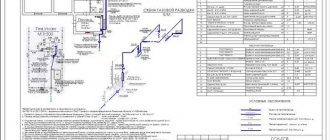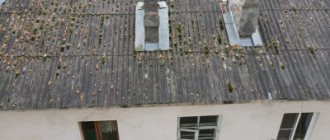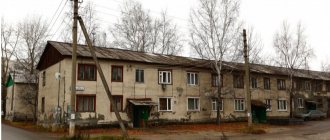Every person living in an old high-rise building must study the documentation that is relevant to the recognition of this building as emergency housing. The fact is that living in such facilities is dangerous and unacceptable, so the state is seeking to resettle citizens from such houses.
Dear readers!
Our articles talk about typical ways to resolve legal issues, but each case is unique. If you want to find out how to solve your particular problem, please use the online consultant form on the right or call. It's fast and free!
Federal Law: general information
Relocation from home can occur for various reasons:
- it is recognized as an emergency, so owners or tenants move to other apartments, and homeowners can receive compensation;
- major repairs are required, so all citizens are moved to temporary apartments;
- The land under the house is needed by municipal authorities for various needs.
The procedure is considered specific and complex, and since 2021 certain changes have been made to it, which affected the owners, since they now have to pay some funds to receive new comfortable housing.
What is the timeframe for relocation from emergency housing? See the link.
The process is regulated by Federal Law No. 185, which relates to housing resettlement.
Program for the resettlement of dilapidated and dilapidated housing on the basis of Federal Law No. 185, watch in this video:
What home residents should know
People living in an emergency building should know many important information:
- life in such a structure is dangerous, since there is a possibility of its collapse or an accident in utilities;
- city authorities must find new places to live for all residents;
- new housing must have the same square footage, and also be located in the same area of the city;
- owners can choose not only new housing, but also compensation;
- If apartment owners choose new housing, they must pay a certain amount to obtain it, and if they do not have it, then they sign a social rent agreement with the municipality.
Important! Knowing about their rights and legal requirements, each person can defend their rights with the help of the court if they are violated by local authorities.
Article 2
Introduce into the Federal Law of July 21, 2007 N 185-FZ “On the Fund for Assistance to the Reform of Housing and Communal Services” (Collected Legislation of the Russian Federation, 2007, N 30, Art. 3799; 2008, N 20, Art. 2254; N 30, Art. 3597; N 49, Art. 5723; 2009, N 15, Art. 1780; N 27, Art. 3267; N 29, Art. 3584; N 48, Art. 5711; N 51, Art. 6153; 2010, N 11, Art. 1174; 2011, N 1, Art. 49, 53; N 23, Art. 3264; N 29, Art. 4291; N 49, Art. 7028; 2012, N 31, Art. 4322; N 53 , Art. 7595; 2013, N 14, Art. 1646; N 30, Art. 4073; N 52, Art. 6982; 2014, N 26, Art. 3377, 3406; N 30, Art. 4219; N 48, Art. 6637; 2015, N 1, Art. 11, 52; N 10, Art. 1418; N 27, Art. 3967; 2021, N 23, Art. 3299; N 26, Art. 3890; 2021, N 31, Art. 4816; N 45, Art. 6585; 2021, N 1, Art. 54, 67, 90; N 18, Art. 2563; N 49, Art. 7508, 7524) the following changes:
1) paragraph 2 of Article 2 after the words “2017” should be supplemented with the words “or in relation to the provisions of Chapter 65 of this Federal Law after January 1, 2021”;
2) part 2 of article 4 shall be supplemented with paragraph 51 as follows:
“51) performs, in the manner and in cases established by the Government of the Russian Federation, the function of an agent of the Government of the Russian Federation in providing social benefits for the purchase of residential premises on the territory of the Russian Federation to citizens belonging to the categories established by federal laws, decrees of the President of the Russian Federation and acts of the Government Russian Federation;";
3) in part 1 of article 14:
a) paragraphs 4, 9, 92 - 95, 97, 99 and 10 are declared invalid;
b) add paragraph 13 with the following content:
“13) the presence of an obligation of a constituent entity of the Russian Federation to ensure the non-provision and non-use of land plots on which apartment buildings were located, the total area of the emergency housing stock in which was taken into account when calculating the increase in the limit established for the subject of the Russian Federation for the provision of financial support for the resettlement of citizens from the emergency housing stock, in purposes other than the purposes of locating public utility facilities, social services, health care, education and enlightenment, public administration, arranging places for sports, physical education, walking, locating parks, gardens and public gardens, locating residential premises, the construction of which is carried out at the expense of funds from the budgets of the budget system of the Russian Federation. This condition does not apply to the land plots on which the specified apartment buildings were located, if the resettlement of citizens from such apartment buildings was carried out as part of the implementation of an agreement on the development of a built-up area and (or) an agreement on the integrated development of the territory.”;
4) Article 15 is declared invalid;
5) in article 151:
a) the name should be stated as follows:
“Article 151. Providing financial support from the Fund for capital repairs of apartment buildings ”;
b) parts 1 - 5 are declared invalid;
6) in article 16:
a) in part 2:
paragraph 3 should be stated as follows:
“3) the volume of funds of the Fund, the volume of shared financing from the budgets of the constituent entities of the Russian Federation, funds from local budgets and (or) extra-budgetary funds for the resettlement of citizens from emergency housing stock for the entire period of validity of this program, but not more than for the current calendar year and two subsequent calendar years with a breakdown of this program into stages, the beginning of implementation of which falls on the specified years;”;
paragraph 4 should be stated as follows:
“4) justification of the need for the volume of funds of the Fund provided for in paragraph 3 of this part, the volume of equity financing from the budgets of the constituent entities of the Russian Federation, funds from local budgets, taking into account the planned areas of use of these funds and the possibility of attracting extra-budgetary funds;”;
b) part 21 should be stated as follows:
"21. The size of the current year stage of the regional targeted program for the resettlement of citizens from emergency housing stock, specified in paragraph 5 of part 2 of this article, is determined in the manner established by the Government of the Russian Federation.”;
c) add part 23 with the following content:
"23. Methodological recommendations for the formation by constituent entities of the Russian Federation of regional targeted programs for the resettlement of citizens from emergency housing stock are approved by the federal executive body exercising the functions of developing state policy and legal regulation in the field of construction, architecture, urban planning (with the exception of state technical accounting and technical inventory capital construction projects) and housing and communal services.”;
d) part 6 should be stated as follows:
"6. The funds of the Fund, funds of equity financing from the budget of a constituent entity of the Russian Federation and (or) funds from local budgets may be spent on:
1) acquisition of residential premises in apartment buildings, as well as in residential buildings specified in paragraph 2 of part 2 of Article 49 of the Town Planning Code of the Russian Federation (including in apartment buildings whose construction has not been completed), and construction of such houses, including for the purposes of the subsequent provision of residential premises to citizens under a social tenancy agreement, or an agreement for the rental of residential premises in a housing stock for social use, or an agreement for the rental of residential premises in a flexible housing stock in connection with relocation from an emergency housing stock, or an exchange agreement with the owner of a residential premises in an emergency housing stock;
2) payment to citizens who own residential premises included in the emergency housing stock, compensation for seized residential premises in accordance with Part 7 of Article 32 of the Housing Code of the Russian Federation;
3) provision of subsidies for the acquisition (construction) of residential premises in an amount not exceeding the difference between the cost of residential premises of equivalent according to the area withdrawn, calculated on the basis of the standard cost per square meter, and the compensation received, and (or) a subsidy to reimburse part of the cost of paying interest in an amount not higher than the key rate for using a loan or credit received in the currency of the Russian Federation and used for the purchase ( construction) of residential premises. The standard cost per square meter is defined as the cost of one square meter of the total area of residential premises, determined for the constituent entities of the Russian Federation by the federal executive body exercising the functions of developing state policy and legal regulation in the field of construction, architecture, urban planning (with the exception of state technical accounting and technical inventory of capital construction projects) and housing and communal services. The provision of a subsidy at the expense of the Fund can be carried out no later than the end of the Fund’s life;
4) provision of subsidies to persons who have concluded agreements with local governments on the development of built-up territories and (or) agreements on the integrated development of territories in accordance with the Urban Planning Code of the Russian Federation, to reimburse the costs incurred to fulfill obligations for the creation or acquisition, as well as transfer to the state or municipal property of comfortable residential premises to provide citizens resettled from emergency housing located on the territory in respect of which a decision on development has been made, upon payment of compensation for seized residential premises in apartment buildings recognized as unsafe and subject to demolition or reconstruction and located on the territory , in respect of which a decision on development has been made. In this case, the subsidy is provided as the specified persons fulfill these obligations and cannot exceed 25 percent of the standard cost of resettlement, calculated based on the total area of residential premises from which citizens were resettled, and the standard cost per square meter. If a citizen owns several residential premises that are part of the emergency housing stock, the provision to him in connection with the relocation from such residential premises of the subsidies provided for by this article at the expense of the Fund is carried out in relation to only one residential premises. In relation to other residential premises owned by such a citizen and included in the regional targeted program for the resettlement of citizens from emergency housing stock, compensation is provided for seized residential premises in accordance with Article 32 of the Housing Code of the Russian Federation.”;
e) parts 61 and 10 are declared invalid;
7) in article 161:
a) the name should be stated as follows:
“Article 161. Providing financial support from the Fund for the modernization of the public utility infrastructure system ”;
b) parts 1 - 11 are declared invalid;
add Chapter 65 with the following content:
“Chapter 65. Features of providing financial support for the resettlement of citizens from emergency housing recognized as such after January 1, 2021
Article 2014. Providing financial support for the resettlement of citizens from emergency housing recognized as such after January 1, 2021
1. The Fund, under the conditions established by this article, has the right to provide financial support from its own funds for the resettlement of citizens from apartment buildings that are recognized in the prescribed manner after January 1, 2021 as unsafe and subject to demolition or reconstruction due to physical wear and tear during their operation.
2. A subject of the Russian Federation that has fulfilled the obligation provided for in paragraph 910 of part 1 of Article 14 of this Federal Law has the right to submit an application for financial support from the Fund specified in part 1 of this article, within the limit of funds for resettlement established for this subject Russian Federation.
3. The provisions of this Federal Law established in relation to the provision of financial support from the Fund for the resettlement of citizens from dilapidated housing stock and in relation to monitoring the implementation of regional targeted programs for the resettlement of citizens from dilapidated housing stock, apply to the provision of financial support from the funds of the Fund, specified in part 1 of this article, unless otherwise provided by this chapter.
4. Financial support from the Fund, specified in Part 1 of this article, is provided when:
1) the presence of regional targeted programs for the resettlement of citizens from emergency housing, recognized as such after January 1, 2017;
2) fulfillment by the constituent entities of the Russian Federation and (or) municipalities in whose territories apartment buildings are located, recognized in the established order as unsafe and subject to demolition or reconstruction and included in regional targeted programs for the resettlement of citizens from emergency housing stock, the conditions for providing financial support at the expense of funds of the Foundation.
Article 2015. Regional targeted program for the resettlement of citizens from emergency housing stock recognized as such after January 1, 2021
1. The regional targeted program for the resettlement of citizens from emergency housing stock, recognized as such after January 1, 2017, is approved by the highest executive body of state power of the constituent entity of the Russian Federation.
2. The regional targeted program for the resettlement of citizens from dilapidated housing stock, specified in part 1 of this article, must contain a list of apartment buildings recognized in the prescribed manner after January 1, 2021 as unsafe and subject to demolition or reconstruction due to physical wear and tear during their operation , and also comply with the requirements provided for in Article 16 of this Federal Law, with the exception of the requirements of paragraph 1 of Part 2 and Part 21 of Article 16 of this Federal Law.”;
9) in article 231:
a) part 1 is supplemented with paragraph 6 as follows:
“6) violation of the conditions established by clause 13 of part 1 of article 14 of this Federal Law.”;
b) part 3 shall be supplemented with paragraph 8 as follows:
“8) Fund funds received by a constituent entity of the Russian Federation and used for the resettlement of citizens from apartment buildings previously located on land plots used in violation of paragraph 13 of part 1 of Article 14 of this Federal Law.”;
c) in part 5, replace the words “in paragraph 3” with the words “in paragraphs 3 and 6”;
d) in part 6, replace the words “in paragraph 3” with the words “in paragraphs 3 and 6”.
Basic provisions of the legislation
Significant information on resettlement is contained in Federal Law No. 185. This indicates the possibility for homeowners to receive compensation or new housing.
After receiving compensation, the owner must leave the property within six months after signing the contract, but other conditions may be specified in the agreement itself.
The main goals of the Federal Law.
Nuances of the program in 2021
The recognition of a house as unsafe depends on various factors, including:
- the wear of a wooden house should be less than 65%, and a stone one - 70%;
- houses are recognized as unsafe if they are located in places where there is a possibility of a landslide or avalanche;
- there is significant damage to the facade or foundation that cannot be repaired;
- if there was a strong fire, then living in such a building is unsafe, and this also applies to floods or the effects of other natural forces.
Owners receive either equivalent housing or compensation, and it must be equal to the market price of the property, which requires an assessment.
Important! If the owner of the apartment does not agree with the proposed redemption price, he can file a lawsuit to challenge it and increase it.
Often, citizens receive from the municipality an apartment with fewer rooms, but the same square footage, and in this case, even the court can recognize such actions of the authorities as lawful if there are no suitable other objects in the fund.
Built houses
To date, the list of new buildings built includes over 12 thousand different houses, the total area of which is more than 10.5 thousand sq.m. If you need to find out the list of built houses, you can also do this using this portal. To do this, you will need to select the “Built houses” category in the same “Resettlement of Citizens” section.
So, for example, more than 21 houses were built in Petropavlovsk, with a total area of 26.66 thousand square meters. m. Construction was mainly carried out in such areas as Aleutsky, Ust-Kamchatsky, and Elizovsky.
Federal Law on Resettlement
Federal Law No. 188 and Federal Law No. 185 indicate that if housing is offered in another area or in another area, then the authorities must provide written explanations of this situation.
Residents of a dilapidated building draw up a new social tenancy agreement with the municipality.
About major repairs of residential buildings.
Changes made to the state program in 2021
The Housing and Communal Services Fund oversees the process of major repairs and resettlement of citizens.
Do I need to pay for utilities in emergency housing? The answers are here.
Thanks to it, regional commissions are formed that evaluate existing houses and apartments, after which it is decided whether they are in disrepair.
The program's actions apply only to houses that are officially in disrepair for various reasons.
The changes affected the rules for providing housing to apartment owners, since in most cases they are required to pay certain funds, represented by an additional payment, for new housing.
What does the commission do under Federal Law No. 185?
After assessing the building, a report is generated that contains important information:
- building plan;
- statements from residents about emergency conditions;
- copies of documents for apartments;
- a conclusion on the basis of which it is decided whether the house is included in the resettlement program.
Important! Residents of the houses themselves can submit applications for assessment.
Features of relocation of apartment owners
Homeowners can choose compensation or a new apartment. Since new housing will cost more than the damaged property, they must pay the required amount of funds to the municipality.
How are lists generated? See here.
If apartment owners do not have the necessary money, they can enter into a social rental agreement or receive compensation.
How is the legality of local authorities’ actions ensured when relocating from dilapidated and dilapidated housing? Watch in this video:
Nuances of relocation and compensation
The process itself is divided into stages:
- housing research is carried out;
- a decision is made by the commission;
- if the house is recognized as unsafe, then all tenants are moved to new apartments, for which a new social tenancy agreement is drawn up with them;
- the owners decide whether they will receive compensation or whether they will receive a new apartment;
- relevant agreements are drawn up.
Important! The duration of the process depends on the condition of the house.
Relocation contracts
So, who and why needs to study information about the resettlement and accident rate of a residential building? Firstly, to the residents of dilapidated houses themselves, who are tired of living in appalling conditions and want to get an accurate answer to the question “When?” Secondly, for those who are planning to buy an apartment and want to check the status and condition of a particular house. For example, in the city of Lipetsk, more than 83 units of contracts were concluded for the purchase and shared construction of premises from various developers for the purpose of relocation. The average contract price per 1 m2 was 36 thousand rubles. It is worth noting that according to all agreements, the relocation was completed exactly on time.
If you want to familiarize yourself with relocation contracts in a specific region, then use this section.
By going to the website, select the region you are interested in, and then the “Relocation Contracts” section. The portal will provide you with the most complete information on the stages of the procedure.
Which houses are considered dilapidated and unsafe?
It's the 21st century, but hundreds of thousands of Russians still live in uninhabitable houses . The state spends serious money on relocating such houses, but this does not happen everywhere. In addition, as dilapidated and dilapidated houses are resettled, more and more new houses fall into disrepair.
Since 2012, a program for relocating citizens from emergency housing has been in effect; it was supposed to end in September 2021. But then it was extended until the entire planned volume of resettlement was completed.
The “old” program concerned houses that were recognized as unsafe before 2012 . But over the years of the program, even more emergency housing has appeared in Russia than was resettled.
Therefore, starting from 2021, it is planned to develop and introduce a new resettlement program, already within the framework of the national project “Housing”. Houses declared unsafe before 2017 will be resettled.
The procedure for recognizing housing as unsafe and its resettlement was regulated by Decree of the Government of the Russian Federation of January 28, 2006 N 47. But the resolution itself did not have clear criteria for recognizing housing as unsafe or dilapidated.
To recognize a house as unsafe, it is now required that there is a risk of collapse in at least half of the premises .
A special interdepartmental commission recognizes housing as unfit for habitation, and it is guided by the “Methodological manual for the maintenance and repair of housing stock.”
In accordance with this manual, the criteria are:
- dilapidated housing - more than 70% wear and tear for stone houses and 65% for wooden ones. It is important that dilapidated housing does not pose a threat of collapse, although it no longer meets operational requirements;
- emergency housing - the supporting structures of the building are worn out or deformed to such an extent that they pose a danger to residents.
Therefore, whether or not to recognize a house as unsafe is decided by the commission, assessing the condition of the structures in each individual case.
The new bill, which is planned to be adopted in 2021, includes approximately the same characteristics: a building with damage or deformations that threaten its stability is recognized as unsafe.
The procedure for recognizing a house as unsafe
before January 1, 2012 are currently applying for resettlement . There is a list of such houses in every region, and most of them have been resettled.
The new program, which is planned to be launched in 2021, will affect all emergency and dilapidated houses that were recognized as such before January 1, 2021.
This means that if the house is recognized as unsafe now, its residents will have to wait quite a long time for resettlement - the planned program will last for 5 years, and a new one can appear only after its completion. However, this still needs to be done - the program can be reviewed and additional money can be allocated for it at any time, so everyone has a chance.
So, if a house begins to fall apart and has problems with supporting structures that threaten its stability, you should contact the interdepartmental commission that is formed in each locality.
When applying, an application is drawn up, to which the following documents are attached:
- an extract from Rosreestr or a social tenancy agreement (that is, confirmation of ownership or right to reside in the house);
- conclusion of the organization that carried out the inspection of the house (the organization must have the appropriate permits).
The examination is carried out by a third party, and it costs money. Therefore, it is recommended to contact the state housing supervision authorities or the prosecutor’s office - they also have the right to contact the commission , but in this case they will pay for the examination themselves.
The interdepartmental commission consists of representatives of various departments - local authorities, housing supervision, sanitary-epidemiological, fire, environmental safety, consumer protection, etc. Owners of residential premises are also involved in the work of the commission, they have the right to vote.
If all these steps are successfully completed, and this was done before 2012 , then the house is most likely already occupied. But in some regions the program has not been fully implemented. All work is carried out by state, regional and municipal authorities.
To “speed up” resettlement work, lawyers advise filing complaints with regulatory authorities - the housing inspectorate, the prosecutor's office, and Rospotrebnadzor.
The date of relocation of the house is indicated in official documents, but it can be found in the Housing and Communal Services Fund, on the Fund’s website, as well as on the sign that is placed on the house that is planned for relocation.
The situation in the regions
As of the beginning of 2021, 6 regions in Russia have not completed the program for relocating citizens from housing recognized as unsafe before 2012. Note that the program was supposed to end in 2021 , but due to the “lagging” regions, its validity was extended. At the end of 2021, it turned out that not everyone had been resettled yet, and the program was extended again - until final resettlement in the regions.
Thus, at the beginning of 2021, more than 3 thousand citizens did not have time to resettle. This applies to the Republic of Karelia, Trans-Baikal Territory, Primorsky Territory, Irkutsk, Moscow and Kirov regions. It is noted that over the past year the number of unhoused citizens has decreased from 6.6 thousand.
The main reason is that officials do not have time to use the allocated money. There are violations in competitive procedures - municipalities usually order the construction of new buildings to resettle dilapidated houses.
It often happens that a construction company that wins a competition is not able to complete the construction . In some regions (for example, in the Irkutsk region), such houses will be completed at the expense of the regional budget.
However, over the 5 years of the program, the state resettled more than 655 thousand people from dilapidated housing, reducing its number by 10.3 million square meters. However, over these 5 years, even more emergency housing has appeared in the country, which will be resettled under the new program.









